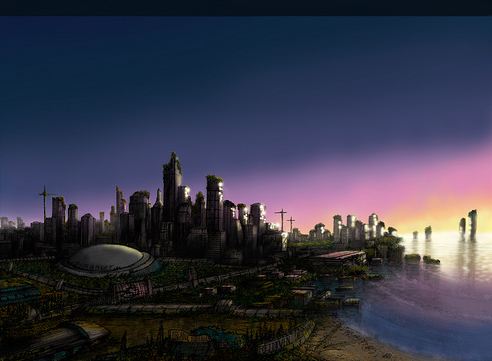My one liner: Man Booker Prize Shortlist. Sci-fi and survival in a post apocalyptic world. But the apocalypse came from a somewhat unexpected source.
Where does our increasingly commoditised world take us, dominated as it is by large corporate entities ? Does the corporate effectively become the state, selecting its “employees” from childhood based on their predicted future capacity to add scientific know-how to the corporation ? As all “knowledge” is now captured, recorded and available on the internet, does regular society become increasingly dumbed-down, with those who opt-in fed on a diet of inane entertainment and leisure, and genetically modified food, while living in faceless corporate compounds ?
It is hard to escape the conclusion that Margaret Atwood thinks so, and it is a vision she returns to in the sequel to this novel, The Year of the Flood (2009), whilst also echoing the society of the Handmaid’s Tale which she wrote in 1985. Humans are valued only for the corporate value that they generate, and
there is a clear material hierarchy between corporates themselves. The vision echoes a Marxian view of a society which is in the immediate pre-revolutionary stage, as capital dominates absolutely and labour, indeed 99% of humanity, is commoditised. And as in Marx, such a society is inherently unstable, and carries the seeds of its own inevitable destruction. In this case the destruction is apocalyptic.
We see the world through the eyes of Jimmy, an apocalypse survivor, whose post-apocalypse name is “Snowman”. He is also a figurehead leader of tribe he has named the Children of Crake. The Children of Crake is a naive and unsophisticated group of survivors of (as yet) unknown provenance who look to him for their material and spiritual guidance, and whom he in turn manipulates, by getting them to provide him with basic foodstuffs and materials. Snowman lives mostly in a tree, because the landscape is populated with wild and dangerous genetically modified animals – for example Woolvogs, a deadly cross between wolves and dogs, and Pigoons, balloon shaped humanoid sentient pigs bred to host human transplant parts – all roaming free after humanity was pretty much wiped out.
The story flips back and forth between pre and post “final destruction”, as we learn more about Snowman’s (aka Jimmy’s) previous existence. His mother who left home (and hence the corporate compound) because she refused to assimilate herself into the commoditised world. She was thus a revolutionary and a security risk, and eventually killed by the corporate security service, the CorpsSeCorps. His “corporate citizen”father’s new wife, the compliant Ramona. Jimmy’s relationship with Crake, his childhood friend, far more intellectually gifted than Jimmy, and eventually landing a place to study genetic research at the Watson Crick Institute, whilst Jimmy goes and studies humanities at the Martha Graham Academy. Inevitably Crake’s ability takes him to a secretive and lucrative role in the field of genomics. And finally there is the woman Oryx. Loved by both Jimmy and Crake. Lover of both Jimmy and Crake. The tie that binds them and the force that splits them. And the subject of Snowman’s woeful reminiscences.
Snowman eventually ventures out of the tree, driven by the need to find food. And as his scavenging treck unfolds, we slowly learn the devastating truth about how and by whom the destruction of society was actually caused. Compelling, to use the reviewer’s cliché.
We get the feeling that Atwood is a pessimist about the capacity of a society dominated by the pursuit of self-interested profit to reach a long-term equilibrium that is both stable and morally good. And given the current debates around extreme income inequalities in our current financial-crisis ridden world, there is much food for thought here as to where that world is heading. Surely though, history has taught us that there are in-built circuit
breaks that prevent society from lurching into extreme states of self-destruction ?
Here is the wikipedia link to the book


 RSS Feed
RSS Feed
